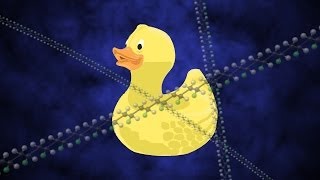(单词翻译:单击)
What do silk, DNA, wood, balloons, and Silly Putty all have in common? They're polymers.
丝绸,DNA,木材,气球和橡皮泥有什么共同点?它们都是高分子聚合物。
Polymers are such a big part of our lives that it's virtually impossible to imagine a world without them, but what the heck are they?
高聚物是生活中一个十分重要的部分,没有高聚物的世界是不可想象的。但它们到底是什么?
Polymers are large molecules made of small units called monomers linked together like the railroad cars from a train.
高分子聚合物是大分子物质,由单分子物质聚合而成,连接起来像是一节节车厢连成火车。
Poly means many, and mono means one, and mers or mero means parts.
它的英文中“Poly”的意思是多,“mono”意思是单,“mers”或“mero”是“一部分”的意思。
Many polymers are made by repeating the same small monomer over and over again
许多高聚物由相同单分子物质重复形成,
while others are made from two monomers linked in a pattern.
有的由两种单分子按照一定模式连接。
All living things are made of polymers.
所有生物都由高分子聚合物组成。
Some of the organic molecules in organisms are small and simple, having only one of a few functional groups.
有些生物体内的有机物小而简,只有很少一些功能单元。
Others, especially those that play structural roles or store genetic information, are macromolecules.
其它功能,尤其作为结构功能或保存基因信息的单元,都是大分子物质。
In many cases, these macromolecules are polymers.
大部分情况下这些大分子都是高聚物。
For example, complex carbohydrates are polymers of simple sugars, proteins are polymers of amino acids,
举个例子,复杂的碳水化合物都是简单糖类的高分子聚合;蛋白质是氨基酸的高分子聚合;
and nucleic acids, DNA and RNA, which contain our genetic information, are polymers of nucleotides.
核酸,包括脱氧核糖核酸以及核糖核酸,它们包含了我们的遗传信息,是核苷酸的高分子聚合形式。
Trees and plants are made of the polymer cellulose.
树木等植物是由高聚物纤维素组成。
It's the tough stuff you find in bark and stems.
它们是树皮和茎的坚硬组分。
Feathers, fur, hair, and fingernails are made up of the protein keratin, also a polymer. It doesn't stop there.
羽毛,毛皮,毛发以及指甲,都由同一种蛋白质角蛋白组成,它也是种高聚物。还有更多类似的例子。
Did you know that the exoskeletons of the largest phylum in the animal kingdom, the arthropods, are made of the polymer chitin?
你知道在动物学中最大的门的动物--节肢动物的外骨骼,是由高聚物几丁质组成的吗?
Polymers also form the basis for synthetic fibers, rubbers, and plastics.
高分子聚合物还包括了合成纤维,合成橡胶以及塑料。
All synthetic polymers are derived from petroleum oil and manufactured through chemical reactions.
所有合成的高聚物都源于石油,通过一系列化学反应合成。
The two most common types of reactions used to make polymers are addition reactions and condensation reactions.
最常见的两种用来制造高聚物的反应是加成反应和缩聚反应。
In addition reactions, monomers simply add together to form the polymer.
在加成反应中,单分子简单的加在一起形成高聚物。
The process starts with a free radical, a species with an unpaired electron.
过程从产生一个自由基开始,自由基是带有一个未成对电子的基团。
The free radical attacks and breaks the bonds to form new bonds.
自由基攻击其它基团,断开化学键以形成新键。
This process repeats over and over to create a long-chained polymer.
这个过程不断重复,逐渐形成了长链高聚物。
In condensation reactions, a small molecule, such as water, is produced with each chain-extending reaction.
在缩聚反应中,小分子比如水分子,将经过每一个链延伸反应。
The first synthetic polymers were created by accident as by-products of various chemical reactions.
第一个合成高聚物是偶然间创造出来的,它是几个化学反应的副产物。
Thinking they were useless, chemists mostly discarded them.
那时候许多化学家认为它们没用,大部分就丢弃了。
Finally, one named Leo Baekeland decided maybe his useless by-product wasn't so useless after all.
直到有个名叫利奥·贝克兰德的化学家,认为也许这没用的副产物并非一无是处。
His work resulted in a plastic that could be permanently squished into a shape using pressure and high temperatures.
他研究下去并制造了一种塑料,可以永久地形成任何一种形状,只要有足够的压力和高温。

Since the name of this plastic, polyoxybenzylmethylenglycolanhydride, wasn't very catchy, advertisers called it Bakelite.
然而这种塑料的名字,polyoxybenzylmethylenglycolanhydride,太长了,商人们把它称作贝克莱特(酚醛塑料)。
Bakelite was made into telephones, children's toys, and insulators for electrical devices.
这种塑料后来制成了电话,儿童玩具以及电子产品的绝缘体。
With its development in 1907, the plastics industry exploded.
自从1907年发现了它,塑料工业发生了爆炸式发展。
One other familiar polymer, Silly Putty, was also invented by accident.
另外一种熟悉的高聚物,橡皮泥,也是偶然发明的。
During World War II, the United States was in desperate need of synthetic rubber to support the military.
在第二次世界大战中,美国十分迫切的需要合成橡胶来支持军队。
A team of chemists at General Electric attempted to create one but ended up with a gooey, soft putty.
通用电气公司的一队化学家曾尝试制造,但最终只得到了一种软黏的油泥。
It wasn't a good rubber substitute, but it did have one strange quality:
它并不能作为橡胶的好替代物,但它的确有一个奇怪的特性:
it appeared to be extremely bouncy. Silly Putty was born!
它的弹性十分优良。橡皮泥诞生了!
Synthetic polymers have changed the world.
合成高聚物已经改变了整个世界。
Think about it. Could you imagine getting through a single day without using plastic?
想想看,你能想象有这么一天不使用任何塑料吗?
But polymers aren't all good.
但不是所有高聚物都是好的。
Styrofoam, for example, is made mainly of styrene,
举个例子,泡沫塑料主要由苯乙烯合成,
which has been identified as a possible carcinogen by the Environmental Protection Agency.
而苯乙烯被环保部认定为一种潜在致癌物。
As Styrofoam products are being made, or as they slowly deteriorate in landfills or the ocean,
随着泡沫塑料的生产,它们缓慢的使得土壤和海水恶化,
they can release toxic styrene into the environment.
它们会释放苯乙烯到环境中。
In addition, plastics that are created by addition polymerization reactions, like Styrofoam, plastic bags, and PVC,
此外,塑料由加聚反应产生,比如泡沫塑料,塑料袋,聚氯乙烯材料,
are built to be durable and food-safe, but that means that they don't break down in the environment.
它们能长久保存且不污染食物,但这同样意味着它们在自然环境中不会自行分解。
Millions of tons of plastics are dumped into landfills every year.
每年成千上万吨的塑料被丢弃到土壤中。
This plastic doesn't biodegrade, it just breaks down into smaller and smaller pieces,
这些塑料不会生物降解,它们只会分解成较小的碎片,
affecting marine life and eventually making their way back to humans.
影响海洋生物,最终伤害到人类。
Polymers can be soft or hard, squishy or solid, fragile or strong.
高聚物可软可硬,可湿软可坚固,可脆弱可强硬。
The huge variation between means they can form an incredibly diverse array of substances, from DNA to nylon stockings.
这些巨大的差异意味着它们能形成从DNA到尼龙丝袜,极其广泛的不同种物质。
Polymers are so useful that we've grown to depend on them every day.
高聚物十分重要,以至于我们每天都十分依赖。
But some are littering our oceans, cities, and waterways with effects on our health that we're only beginning to understand.
但有些正在污染我们的海洋、城市以及水源,最终威胁到我们的健康。而这一点我们才刚刚理解。


